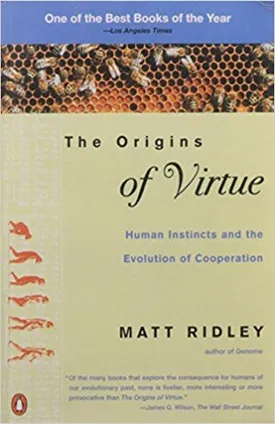The Origins of Virtue: Human Instincts and the Evolution of Cooperation by Matt Ridley
The Origins of Virtue: Human Instincts and the Evolution of Cooperation by Matt Ridley takes readers through a journey of how humans, animals and societies evolved to form complex and mutually beneficial relationships. Ridley argues that cooperation is at the heart of human nature, and that our mammalian ancestors had already formed sophisticated systems of cooperation ages before human civilization began.
Ridley gives us insights into the origins of cooperative behavior in our earliest ancestors by demonstrating that cooperation was likely an evolutionary adaptation. This adaptation may have helped them survive in the same environment, so that weaker species weren’t wiped out and those that survived had an advantage. He explains that most species evolved in social groups, with cooperation and mutual aid being essential for their survival.
Ridley then looks at how humans evolved in ways that led to greater and more complex forms of cooperation. He argues that some forms of moral behavior, such as fairness and the “Golden Rule”, arose out instincts related to the emotions of sympathy, empathy and guilt. By drawing on data from psychology, anthropology and history, Ridley traces the emergence of these moral instincts back to our earliest known societies, such as hunter-gatherer communities. He examines a variety of phenomena, from the evolution of altruism, human rights and economic exchange, as well as religious and social customs, to uncover why our species has become so fond of cooperation.
Ridley debunks the widespread notion that cooperation is a product of social contract theory, and that our behavior is completely governed by the desire to maximize self-interest. He shows that the morality of humans has evolved over time, and that many of our cooperative behaviors are more instinctive than rational. He also explores the tension between the selfish and altruistic tendencies of humans, and argues that even selfish behavior has evolved to be beneficial for society as a whole.
The Origins of Virtue: Human Instincts and the Evolution of Cooperation sheds light on the evolution of human cooperation and the motivations behind it. By examining the evolution of cooperation through different lenses, Ridley reveals how human societies have coordinated and organized civil, social and moral behavior. He also explains why humans have grown to excel in cooperation, and why our species has become so successful in surviving in an ever-changing environment.

